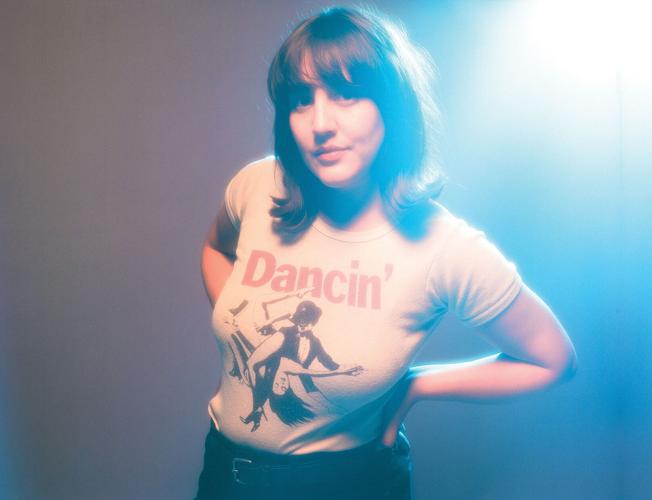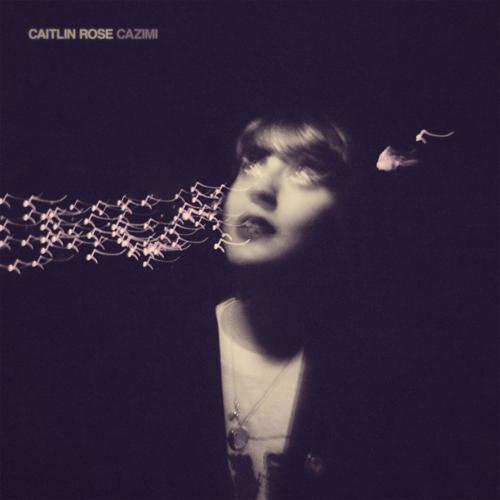
While plotting her third album Cazimi, Caitlin Rose frequently found herself bumping up against an unanswerable question: What, exactly, should a new Caitlin Rose record sound like?
Should it hark back to the prescient blend of roots rock and gently traditional country of her landmark 2010 full-length debut Own Side Now? After all, that album, recorded with Mark Nevers at his revered home studio Beech House, seems in retrospect like a note-perfect roadmap for the Americana music boom that would consume her hometown of Nashville in just a few years. Or how about 2013’s widely acclaimed The Stand-In, which expanded sonically on its predecessor?
For Rose, the goal was to abandon those frameworks altogether on the new album, out Friday — and in many ways, to start from scratch. Instead of writing and recording in ways that gestured toward the public perception of “Caitlin Rose, capital-A Artist,” she tapped into the myriad experiences that shaped her creatively during the nine-plus years since The Stand-In. That journey into herself led to Rose crafting her most honest project yet, one that eschews the constraints of expectations in favor of intuition and vulnerability.
Rose produced Cazimi with Jordan Lehning, the widely loved Nashville producer who has worked with scores of country artists and songwriters over the past decade and who also co-produced The Stand-In with Rose and Skylar Wilson. After combing through years of accumulated material that hadn’t been released, Rose whittled down the collection to a batch of songs that best represent her artistic perspective now — though she hasn’t released new music in a long time, she never stopped listening and writing. Lehning helped assemble the final sequence, and the pair spent a week tracking at Sound Emporium in February 2020.
“Some of these [songs] were written in 2014,” Rose says. “Of all the songs I’ve written, these were the ones I just kind of kept. I kept shedding songs. So, you know, one that I was so positive would be on a record would actually end up not fitting. But this record always felt like a hypothetical thing, because I tracked something in 2017 that was abandoned.”
Like many artists, Rose found herself sitting on what she then believed to be a finished album when the COVID-19 pandemic struck. Rather than release the record into an uncertain world, she revisited the material and revised it for nearly a year, meeting with Lehning every month or so to record new parts or change others. It was the first time she’d had the luxury of sitting with a record without pressure to release new music. That freedom helped shape what Cazimi grew to become.
“The delay, really, more so made this record what it is, because Jordan and I ended up taking like a year to just mess with it,” Rose says. “Kind of like what we used to do just working on demos. I would take songs in and just see what we could do with them, just from a ‘play’ sense.”
There is a sense of sonic playfulness running through Cazimi, from the warm opening chords of opener “Carried Away,” weaving in and out all the way through closer “Only Lies.” Rose says co-producer Lehning was key both to keeping the process lighthearted as well as to her ability to realize her own vision — particularly given that false start in 2017. “I don’t think I was working on a project that I felt like I was truly in control of until I was working with Jordan,” she says.
While she already had songs under her belt, a chance conversation at the William Tyler Band and Friends show at Drkmttr in 2019, which doubled as a tribute to the late David Berman, gave her a chance to assemble a band for the first time in several years. “It was William Tyler, Jack Lawrence, Luke Schneider, Brian Kotzur,” says Rose. “That was the day before I asked everyone if they would do [the album] with me and we booked the studio, Sound Emporium. I was talking to one of them and I said, ‘I just wish I could just make a record with you guys.’ And someone was like, ‘Well, why can’t you?’ ”
Being able to reconnect with the Nashville community so present for the earlier phase of her career buoyed Rose during those initial sessions and well into the pandemic uncertainty. She says that time spent touring — first all over the U.S., and later around the globe — in support of her first two albums left her feeling disconnected from her hometown and discouraged from making more music. Regrouping so easily with players she loved and respected helped temper those feelings.
“There’s been a lot of little moments where I realized, like, Nashville still has my back, you know?” she says. “For a long time, I felt very disjointed from Nashville. And now it’s an all-Nashville record. And it feels like I’m doing what worked for me to begin with and what I really enjoyed, and that’s being a part of this community and this scene.”
Among the highlights are the aforementioned opener “Carried Away,” a warm and layered song blanketed by a velvety, subtly swelling rhythm section that seems to melt into Rose’s vocal harmonies, which on this track recall Jenny Lewis or Erin Rae. “Modern Dancing” is deceptively peppy, pairing an elastic beat and chirpy keys with cutting lyrics like, “You know this city was built for the wrecking ball,” and, “No matter which way you play, it’s all secrets and lies.” “Blameless,” another older song, charts the complexity of a fraying relationship. Of its origin, Rose says: “The only way I could explain that one is to go to a bar with you and talk to you about, like, the last 12 years. But it is sort of an anchor for the emotional journey of the record. And I love that it’s one of the country songs on the record.”

Cazimi takes its name from an astrological term describing the phenomenon of a planet being within one degree of the sun. When Rose was workshopping album titles, she explains, Cazimi was the only choice that “everyone hated.” Once again, Rose, who spoke earlier in our conversation of the power of using mantras, chose her intuition over the opinions of others.
“It was a title that just really kept sticking,” she says. “I had all these other ones. And I was like, ‘That’s cool. That’s fine.’ But like we were saying, with the idea of mantras or words to follow, ‘cazimi’ always felt like this really positive light for me to hold onto. We’ve had five huge cazimis in the eight months since this record really began taking shape, like the day we finished mixing and the day we signed a deal. It just kept happening.”
Cazimi closes with a full-circle moment: a new take on “Only Lies,” which appeared as a bonus track on the 10th anniversary reissue of Own Side Now. This version trades the moody slow-burn of the original for urgent, poppy heartland rock, projecting a sense of momentum that one can only hope means Rose has more music to share down the road. It’s also one final reminder of the spirit of freedom and experimentation that drove Rose while making the LP.
“This record doesn’t have to be what I think I’ve worried about in the past,” she says. “It doesn’t have to be this holy, perfectly put-together, understandable thing. It hops all over the place. And it’s more like something I did make for me, because I’ve been kind of being pushed into making something for other people for a minute, and it just did not work. At some point I asked Jordan, ‘What are people going to think of it?’ And he said, ‘This is the most “you” thing you’ve ever made. It’s just that nobody knows who you are.’ Who we are is never perfect, but it’s nice to feel like you didn’t compromise who you are.”









